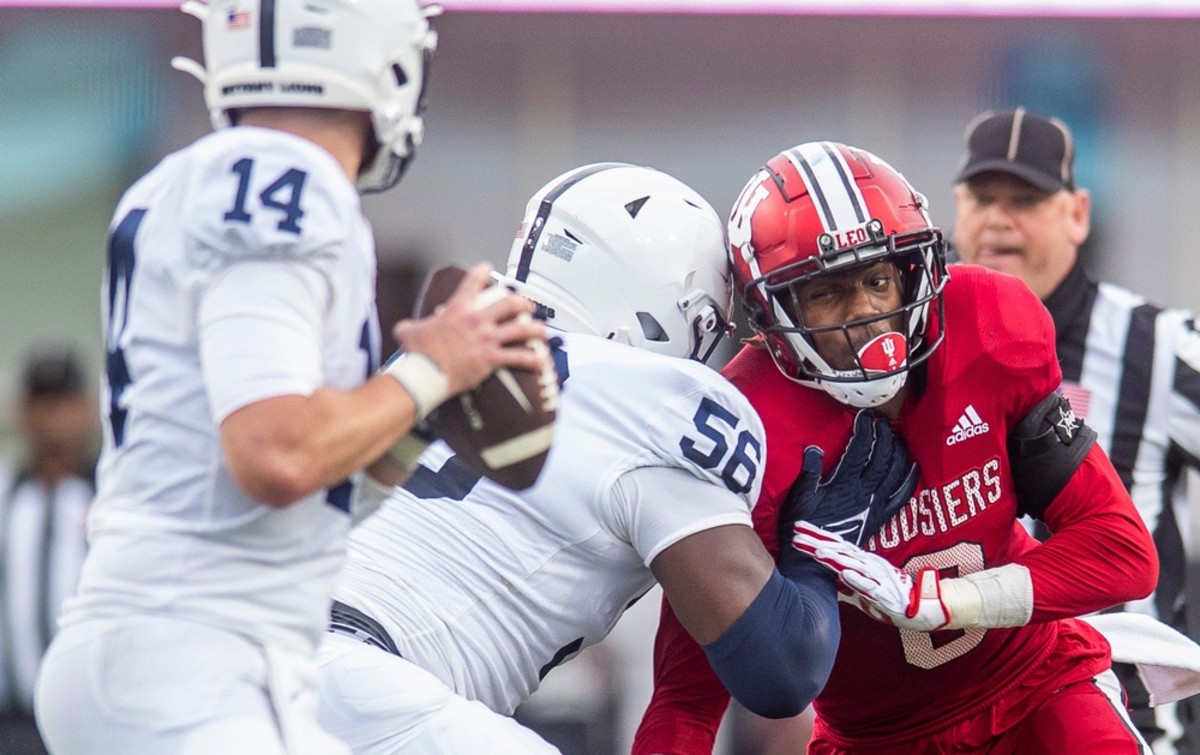Dasan McCullough Walked, But Indiana Coming Up Short on NIL Money Not Only Reason Why

BLOOMINGTON, Ind. — NIL is drastically changing the landscape of college football, widening the gap between the haves and have nots, with a sprinkling of subsets in between. The high-stakes recruiting world has been flipped on its head.
For Indiana, a football program that has lost more games than anyone and hasn't won a Big Ten conference championship in 55 years, trying to compete in this new world is a massive challenge. It's always been difficult — some would say impossible — to win recruiting battles for high-end talent with Ohio State, Michigan, Penn State and the others.
That we already know, and have known for decades now.
The Hoosiers have had two consecutive years of their best-ever recruiting classes, benefiting from 8-4 and 6-1 regular seasons in 2019 and 2020 under effervescent coach Tom Allen. They had the 30th-ranked recruiting class in 2022 — and, yes, the fact that this is the highest ranking in school history says a lot about the problem — with the prized piece of that class being Dasan McCullough, a 6-foot-5 edge rusher with a telling football pedigree and an NFL future.
Indiana had to recruit him several times, first in high school in Kansas and then in Bloomington when his family moved here. His father, Deland McCullough, brought the family to Indiana after leaving the Super Bowl-champion Kansas City Chiefs to join Allen's staff as a running backs coach. Dasan, who was committed to Ohio State at the time, flipped to Indiana.
His older brother — Deland II — transferred from Miami of Ohio, and his younger brother Daeh committed to Indiana, too. It was a great family story, all of the McCulloughs together at Indiana.
Allen and his staff had to re-recruit him several times, including after his father moved north to Notre Dame for a better job after just one year at Indiana. They did it again after his younger brother de-committed and again after two years of great Indiana football turned into a brutal 2-10 season in 2021.
McCullough, a four-star recruit with the highest ranking in school history, came anyway.
He had a great freshman year despite the Hoosiers going 4-8, making some freshman All-American lists. And so, in this new NIL world, after the season was over, Indiana needed to recruit him all over again.
When it comes to NIL money, the coaches aren't at the table, replaced by leaders of Indiana's NIL collectives and some prominent football supporters. This time, though, it was very different, according to several sources familiar with the negotiations.
McCullough, according to sources, had a number in mind. He wanted $300,000 up front, and another $5,000 per month in spending cash for the year.
A total of $360,000 for the 2023 season.
But there were plenty of football issues as well that McCullough was concerned about, so the NIL talks in early December weren't the be all, end all. It was just part of his checklist for any school, a source said, ''and the NIL stuff was important, but not a priority. It was nowhere near the top of his list, but it was on his list.''
Still, the money talks needed to take place.
How the negotiations played out
Hoosiers For Good, an Indiana NIL collective, had discussions with McCullough and his father and said they could give $100,000 and work on the rest. That wasn't enough. According to Tyler Harris, executive director of Hoosiers For Good, he explained to them that because HFG was a 501(c)3 non-profit, anything over $100,000 raised eyebrows, but there were other approaches they could take.
Hoosiers Connect, another Indiana collective, added another $100,000. Others involved in the talks said they told the McCulloughs that they would need time to raise other funds, but that they also had concerns about the payments being made all up front, especially with transfer portal windows still opening before the start of the 2023 season.
There was some concern, one source said, that he would simply take the money and run with such a large up-front payment. A different source close to McCullough, though, said ''that would have never happened. He's straight up. He's not the kind of kid to do something like that.''
Multiple calls to the McCulloughs weren't answered. Dasan, who had several program-related concerns on his checklists, canceled interviews with his coaches, and didn't return phone calls from Harris and others involved in the talks. The two sides never got together again.
When the transfer portal window opened, he jumped in. This past weekend, he and his younger brother Daeh, a four-start defensive back in the 2023 class, committed to Oklahoma.
Sooners? Later, Hoosiers.
Done Deal. #OUDNA pic.twitter.com/dMMoqZ1j0J
— Dasan Mccullough (@Dasan2022) December 13, 2022
'It's the world we live in now'
Tyler Harris worked in compliance at Indiana before being hired as the executive director at Hoosiers For Good. Several prominent Indiana boosters are involved, and they pair athletes with non-profits to direct NIL dollars to the athletes and do good work for the charities. Hoosiers Connect was added earlier this year, and has directed several hundred thousand dollars to IU athletes, as well, in a more direct way.
That's how the game has changed.
Harris is executive director of both groups, which have two different boards that he answers to. Collin Hartman, a former Indiana basketball player, also helps run Hoosiers Connect. They have made deals with dozens of athletes so far, across many of the school's 24 varsity programs. It involves millions of dollars, with a recent campaign that raised another million that was matched by an anonymous donor.
It's big business, and it's changed the way college sports are run.
"We want to do it the right away. That's always going to be the first rule at Indiana,'' Harris said during an interview. "I've known Coach Allen for a long time, and we are close personally, but we avoid specific NIL talks. There is never a time where Tom could say 'this player gets this much.' Those conversations never happen. They can't; it's the rules.
"It's easy for us to look at statistics and metrics that we use to evaluate athletic performance and social media. And specifically with Hoosiers For Good, we want to do good by our charities too, and we try to match up athletes we select with causes that might matter to them. A few years ago, there was never anything like this. But it matters a lot to our players now, so that means it has to matter to us. That's why we're here, and we're excited to help. It's the world we live in now.''
NIL money that goes to players all comes with a commitment of some kind. There are no free handouts, Harris said. Fund-raising has become a key component, of course, because they can do more with more money. For football, for basketball, for other sports as well.
"Some donations are sports specific, but the large majority of our donations come in where we can be flexible with various sports,'' Harris said. "With football, for instance, every donation earmarked for that sport, they want to help, and we provide our two cents on where that money should go.''
Harris said there is no communication with recruits, because that's against the rules. They can't discuss specific options ''until they are enrolled or attending classes,'' Harris said. When recruits ask coaches, Harris said all they can do it tell the recruits about deals that current players have.
No deals get done behind the scenes, he said, because that would be an NCAA violation. "We're Indiana, and we care about those kind of things,'' Harris said. "Some fans may hate this, some love it. We don't have those conversations that some other schools might have, because maybe they did those things under the table before. At IU, we've never done that.''

Recruiting current players a big thing now
The NCAA's changes to name, image and likeness legislation occurred two years ago about the same time as changes to the transfer rules, where athletes can now switch schools without sitting out a year, as they did before.
It's become so critical that the NCAA actually changed the recruiting calendar to give coaches more time to recruit their own players. After the final week of the regular season, it's now a ''dead week'' for being on the road to recruit high school athletes. That's because coaches need to be home that week, recruiting their own players and getting them to stay.
The NIL discussions often come into play along with the football talks, but separately and never together.
"We have conversations with several players, all of those things happen,'' Harris said. "Some do it themselves, some have their parents involved. We remind them about the benefits of being Indiana athletes, and we talk often to them about what we might be able to do for them now, but also what we can do down the road. There's a certain trust factor that's built in there, and we're making that a high priority.
"Look around the country, and you'll see some schools having a problem with that, making promises that they don't keep. We'll make a player an offer, and many times they'll accept that. Sometimes we'll get players who come back and ask for more, and we do what we can. I'm not the sole decision-maker — I have boards that I answer to — but when we come to terms, what we promise is what they get.''
Harris said that was the case with McCullough. They tried, and worked hard to expand the offer with other opportunities. But then everything went silent and McCullough was on his way.
"With a lot of athletes, we've had multiple talks,'' Harris said. "Certainly we did with Dasan. Even after the transfer portal opens, we will still have conversations with other players because the coaches are still recruiting them, too. It's still ongoing.''
When McCullough entered the portal, he took a weekend official visit to Oklahoma with his younger brother, Daeh. He had just de-committed from Cincinnati after head coach Luke Fickell took the Wisconsin job, and they had a great time together on the trip to Norman, Okla.
I won’t flood y’all but it was a special weekend ♥️😊 pic.twitter.com/4eprlwZrft
— Darnell McCullough (@darnellm_) December 13, 2022
The early signing period begins next Wednesday, Dec. 21, and both McCullough sons are expected to sign with Oklahoma on the first day. The Oklahoma NIL people will be waiting for the signature to dry.
Oklahoma is coached by Brent Venables, who came there from Clemson last year. The Sooners play in the Big 12 right now and are a perennial power. They're moving into the SEC soon.
One source close to McCullough said that this transfer ''was a lot more about football than it was NIL. He knew he would have opportunities no matter where he went. I think, to be honest, so much has changed in the last two years at Indiana, with his mom and dad being gone now, and his brothers gone and the team struggling.
"I think it was pretty easy to get excited about a better opportunity, and Oklahoma is a great football school with a lot of football tradition. And it's so easy to transfer now, that I guess it made sense.
"This is the way it is now. It's easy to come and go, and I guess it's fair to say that the recruiting never stops.''
